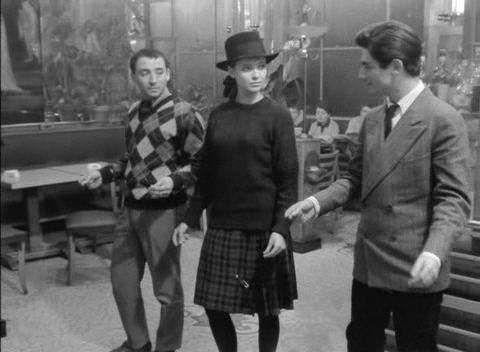Band of Outsiders is generally considered one of Godard’s most accessible and warmest films. In a review here a while back, Robert Stanley Martin, called it “an ode to the joie de vivre of adolescence,” filled with charm, and humor.
Robert’s review was a big part of why I rented the film. And I can see, at least in part, what appealed to him. “Band of Outsiders” is filled with the joy of moviemaking; the rush of turning on a camera and almost magically creating art. You can see this in the bravura sequences that Robert points to — the scene when the three main characters declare a minute of silence, and the soundtrack cuts off for 30 seconds, or the famous dance number, or the giddy race through the Louvre. But it’s there even in less flamboyant moments. For example, there’s one scene, shot from a distance, in which the protagonists have to step around two men carrying a rug. It’s nothing special, and barely visible, but the very gratuitousness of it is a kind of high spirits — a gleeful insistence on imitating the stochastic bumps of reality, and a kind of celebratory whoop that film makes that imitation possible.
But while, as I said, I can at least partially key into why Robert enjoys the film, I can’t say that I actually liked it myself. Part of the problem, perhaps, was that, where Robert appreciated the movie as an enjoyment of youth and adolescence, I had a lot of trouble doing that for the banal reason that the actors just didn’t seem young. Indeed, Claude Brasseur, who played Arthur, was 28 at the time of the filming, and looked older; Sami Frey, who played Franz, was 27; Anna Karina (Odile) was 24. As a result, much of their childish tomfoolery — passing notes in English class, for example — comes across less as cheerful high spirits, and more as a kind of decadent desperation. Karina’s blushing bashfulness and flirtatious eye-batting, which Robert (and I think many other critics) found winning, seemed to me like almost queasily self-parodic camp. The scene where, after Arthur’s suggestion, Odile mincingly changes her hair-style, suggests both drag and Pygmalion; a fantasy in which a woman becomes, or is possessed by, a suggestible girl.
Godard is a filmmaker obsessed with the filmness of film; as such, I’m sure that the discrepancy between the actor’s ages and the character’s ages was not an accident. Rather, I think Godard is celebrating not so much the dance of youth as the filmic potential of a dance of youth. The film isn’t about “real” adolescence, but about faux adolescence — especially about the power of film to provide a playground for adults. Thus, for example, early in the film Arthur and Franz engage in a mock gun battle; when Arthur is “shot” he performs an elaborate thrashing “death scene”. Towards the end of the film, Arthur is really (or should that be “really”?) shot, over and over again, by his uncle — and his death scene is even more ridiculous and extended than the fake scene from the beginning of the movie. That’s possible because, of course, the real scene isn’t any more real than the fake one. The kids playing around in the first are just like the adults playing around in the second, a truth only emphasized by the fact that the kids playing around in the first are actually adults playing kids playing around.
I’ve no objection to self-referentiality in itself — but the way Godard does it always leaves a bad taste in my mouth. Perhaps it’s the smirking deliberateness of his playfulness. Having the teacher read Romeo and Juliet while Arthur courts Odile couldn’t be much less subtle. And as for that oh-so-cheeky run through the Louvre, turning art into play into (by means of the cinema) art — you just wonder how he manages to even see the footage what with all that winking. The heist tropes, the romantic triangle tropes; their tropeness never functions as critique or even really as comment. They’re just “fun” because they’re “cinema”; nifty elements to manipulate, like the soundtrack. For me, “Band of Outsiders” felt less like an exhilarating romp, and more like an hour and a half of being lectured on what an exhilarating romp I was experiencing. Godard the self-referential lecherous control freak doesn’t entirely thrill me…but it seems at least less oppressively self-congratulatory than Godard the insistently whimsical maestro.

